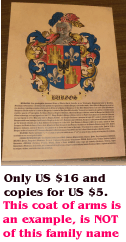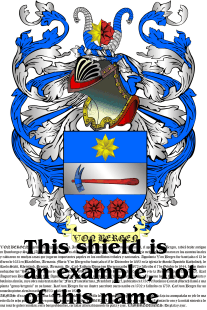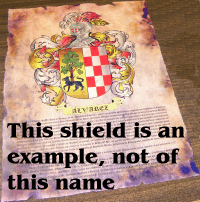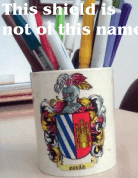
Parchment with the coat of arms, origin and history for the family name Abiñin. Very cheap.

Coat of arms for Abiñin and the history and origin for the family name Abiñin in JPG or Vectorial files as Corel-Draw, AI, WMF, etc.
Julio de Atienza, in his book "Nobiliario Espanol", collects the heraldry and history of the family name Abiñin. This work is of great importance for the heraldry because it collects the history, evidence of nobility and nobility of surnames and lineages among which is the family name Abiñin. The name Abiñin also appears in the "Heraldic and Noble Dictionary of the Kingdoms of Spain" by Fernando Gonzalez Doria, although he presents less data on the name Abiñin than the "Nobiliario Espanol".
The family name Abiñin appears collected by the Chronicler and King of Arms, Don Vicente de Cadenas y Vicent, in his "Repertoire of Coats of the Hispanic Community", that means that the lineage Abiñin has official coat of arms certified by King of Arms. Said Repertoire of Blazons of the Hispanic Community is the greatest work of Spanish heraldry, where the surnames with his heraldic appears like the family name Abiñin arranged alphabetically, with their coats of arms. In this work have included the content of many manuscripts of the National Library of Madrid and corresponding to Minutes of Kings of Arms and collects surnames that as Abiñin are Spanish or very linked for some reason or other to Spain, so those of the family name Abiñin are in this position. There are also thousands of heraldic and heraldic shields from several Sections of the National Historical Archive, as well as the Royal Chancery of Valladolid, Salas de los Hijodalgos of Vizcaya, etc. In summary, those of the surname Abiñin have made some test of nobility or knightage.
One of the most distinctive qualities of heraldry is the use of a limited palette of colours and patterns, usually referred to as tinctures. These are divided into three categories, known as metals, colours, and furs.
Next we are going to see the meanings of three tinctures:
1) GULES: Red color that symbolizes Strength, Victory, Daring and Highness.
2) SABLE: Black color that symbolizes Prudence, Sadness, Rigor, Honesty and Obedience.
3) PURPLE: Justice, Wit, Truth, Greatness, Wisdom and Love; those who wear this color are obliged to defend the Prince defending ecclesiastical people.
Next lets look at the characteristics of some figures that we can find in heraldry and crests:
* NETTLE: The Nettle symbolizes Affliction.
* PEACOCK: The Peacock, by its head denotes Prudence; for his chest, of gold and sapphire, Loyalty, Fidelity and Zeal; in the hidden and submissive of his steps, Secret, and in the terribly out of tune voice of his singing, Terror of enemies.
* WINDMILL: The Windmills and their Wheels are a symbol of Obedience, because they face the violence of the current and obey the movement that it prints.
* FIG: The Fig Tree or its leaves symbolize the State Benefactors.
* ROUNDLE: The Roundles symbolize the bucklers that the soldiers carried as a defensive weapon.
* SWAN: The Swan, by the tradition that he sings sweetly when he is about to die, means Ancient Nobility, without stain of any kind, who dies courageously executing glorious undertakings.
* borduraNOusar: La Bordura simboliza Protección, Favor y Recompensa; asimismo la cota que vestían los caballeros y que al salir de la pelea, ostentándola manchada de sangre enemiga, eran premiados con el añadido de la bordura de escudo, como insignia de Valor.
* WOLF: The Wolf is a symbol of a Constant Heart that suffers the calamities of war and siege with generous spirit; but when the time comes to fight in the open field, he fiercely fights, without giving his enemy a barracks.
* The family name Abiñin appears in the list of last names of Heraldry & Crests so its complete history, crest and coat of arms or heraldic shields can be known on his website: http://www.heraldrycrests.com/
Heraldry for family name Abiñin as well as its history is at your disposal here: Heraldry, history, origin, crest and coat of arms of the family name Abiñin
Related Words: Abiñin family crest | Origin of the name Abiñin | Genealogy of the family Abiñin | Heraldry of the name Abiñin | Coat of arms of Abiñin | Genealogy of the Abiñin | Origin of the Abiñin | Meaning of the name Abiñin.

All the information about the surnames that are collected in this web site are based on verified bibliography.
Origin of family name, history and coat of arms/crests

